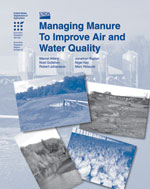Managing Manure to Improve Air and Water Quality
- by Marcel Aillery, Noel Gollehon, Robert Johansson, Jonathan Kaplan, Nigel Key and Marc Ribaudo
- 9/1/2005
Overview
Animal waste from confined animal feeding operations is a potential source of air and water quality degradation. Pollution from animal waste poses challenges to farmers and to resource managers because it can affect multiple resources while environmental laws typically focus only on a single resource. This report assesses the economic and environmental tradeoffs between water quality policies and air quality policies that could require the animal sector to take potentially costly measures to abate pollution, based on a farm-level analysis of hog farms, a national analysis including all sectors, and a regional assessment in an area with high animal numbers.
Download
-
Entire report
Download PDF -
Report summary
Download PDF -
Abstract, Acknowledgments, Contents, and Summary
Download PDF -
Introduction
Download PDF -
Animal Agriculture and the Environment
Download PDF -
Water-Air Tradeoffs at the Farm Level
Download PDF -
National Effects of Coordinated Manure Management
Download PDF -
Impact of Spatial Factors on the Costs of Manure Management: A Case Study of the Chesapeake Bay Watershed
Download PDF -
Summary and Implications for Policy and Research
Download PDF -
References
Download PDF -
Appendix A
Download PDF -
Appendix B
Download PDF -
Appendix C
Download PDF -
Appendix D
Download PDF


